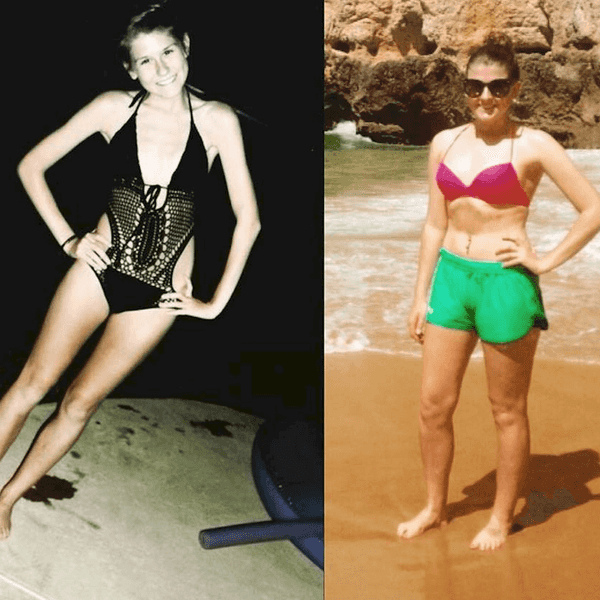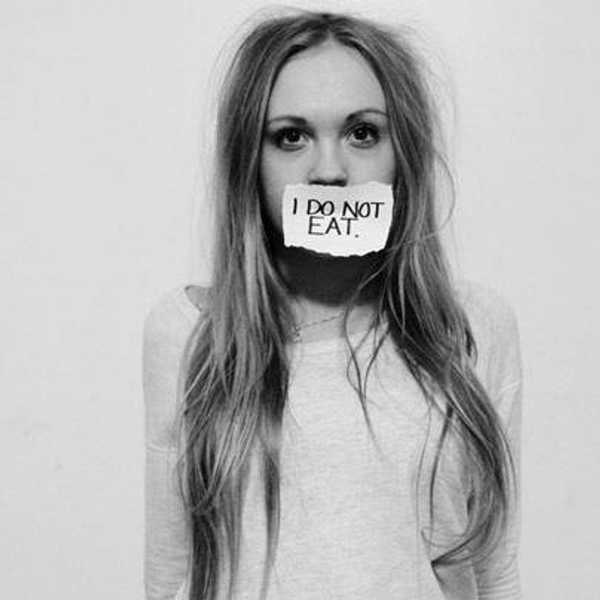Note: This is a trigger warning to anybody out there who has struggled/currently struggling with an eating disorder or body image. I also realize that there are many forms of eating disorders (all of which are valid of seeking help in recovery), but in this article, I will mostly be referring to those categorized by food restriction and over-exercise. This is because I'm speaking from my own personal experience.
For more information and ways to seek help visit the National Eating Disorders Association's website, or call their helpline: (800) 931-2237.
Not all eating disorders stem from wanting to be thin and "healthy," though I will admit mine started off that way. The goal and desire to achieve the "perfect" body only lasted for so long, until my eating disorder developed a mind of its own. She had her own agenda, her own goals, and her own rules. I was forced to abide by them without even realizing it.
When I was diagnosed with anorexia, I didn't believe it. I couldn't possibly have an eating disorder because thought I was just "healthy." I went to the gym and I ate "healthy" foods. I was doing everything diet culture has been telling me to do since I was a little kid: eat low-calorie foods and slave away at the gym every other day. And surely the masterminds behind dieting, fasting, and juice cleanses weren't BSing me...right? Not quite.
I wasn't convinced I had an eating disorder because I was still a functioning human being on the surface. But on the inside, I was far from fully-functioning. I was no longer Ellena — I totally lost myself. I was just a vessel for my eating disorder to take over my life.
I have been in and out of different levels of treatment since January, and I've learned quite a lot about eating disorders. I've come to accept that although mine came from a health-oriented mindset, there were many underlying issues I used my eating disorder to cope with.
I want to clear a few things up about eating disorders in this article. The main point I want to make is that eating disorders are not just about wanting to be healthy. They are not a phase or a fad diet. They are mental illnesses that often work hand-in-hand with other psychiatric disorders such as anxiety, obsessive-compulsive disorder (OCD), drug and alcohol abuse, and panic disorders, according to the American Psychiatric Association. Family history and past traumatic experiences can also cause one to develop an eating disorder.
There's also a brain chemistry element to eating disorders. We were born with certain imbalances in our brains that we simply couldn't help. And that's another thing I wanted to point out — you don't just wake up one day and choose to have an eating disorder. It develops out of your control, and you just can't help it.
SEE ALSO: 25 Percent Of Women Worry About Food Every Half Hour, So Kindly Shut Up About Your Newest Diet
On the other hand, somebody with an eating disorder can't just decide one day to give it up and start eating "normally" again. Sure, we can fake it 'till we make it, but I know from experience that that is very hard to do. Recovery requires hard work, support, and oftentimes professional help.
So, no. Eating disorders are not all about being healthy and "fit." But I understand why someone without an eating disorder may think that. Weight and body confidence are both components of diets, and they're also components of eating disorders. So why wouldn't the two be synonymous?
Well, you see, when someone has an eating disorder, there is usually something else going on in their life that they're avoiding to deal with. Whether they believe it or not, the eating disorder is a coping mechanism for difficult feelings, thoughts, and emotions they can't face on their own.
I started to realize this when I was in a treatment center over this summer. Because I will admit, I really thought they were all about health, too. But in treatment, I met a lot of people from all over the country, all with different backgrounds, ethnicities, genders, and eating disorders. None of us had all the same behaviors and symptoms, but these strangers understood me more than a lot of people in my personal life did.
Meeting fellow patients and hearing their stories really helped me realize that eating disorders are not about wanting to be fit and healthy.
Out of courtesy for my program peers and friends, I won't go into detail about why any of them were in treatment. Refer back up to the APA's definition of eating disorders if you want a general idea.
But, I will tell you why I was in treatment. It's wasn't because I was obsessed with dieting. I mean, yes, I was obsessed with dieting and controlling my body weight, but not for the right reasons.
It wasn't because I wanted to keep my body nourished and strong. It was because I have anxiety, OCD, a fear of abandonment, low self-esteem, and a constant need for control.
I wasn't always like this. A year ago, I'd go to the gym every other day and push myself, but I'd always refuel with food after. I'd make healthy choices in food, but I'd always eat enough each day. I used to count my calories...when I was 12. I went eight years without it, until one day it popped back into my life again.
Last September when I rediscovered calorie-counting and banking, a switch flipped in my head. And for the next eight months, that's all I could do. Because, finally, I thought I was doing something right.
Controlling myself around food, restricting my intake and calculating how much I burned at the gym every day became my only way to cope with anything. Deep down I knew it was wrong, but it just felt so right in the moment.
Diet culture has been my biggest influence since I was six years old. I grew up just accepting that there were "good" foods and "bad" foods, and that if I ate something "bad" and didn't exercise to compensate for it, I was a bad person. A failure.
So whenever something in my life didn't go right — I missed a homework assignment, my OCD was acting up, I felt like my friends were going to abandon me — I turned to my food rules. I'd restrict my calorie intake and force myself to go to the gym.
Although the food and exercise had absolutely nothing to do with what was actually bothering me, I just needed to feel as though I was doing something right. And because I was convinced following my food rules was a "good" thing, that's what I'd do to fill the void.
I won't tell you all my whole life story. That would take a long time. But all you need to know is that there were a lot of other things going on in my mind that made me feel like I was crazy. I bottled it all up and used my ED-behaviors to cope.
I didn't think I had a problem until it was almost too late.
It took me eight months to realize I had a problem because, in my eyes, I wasn't important enough to get help. I wasn't good at anything, so how could I be good at restriction? There was no way I'd possibly be good enough at it to eventually be diagnosed with an eating disorder, right? Wrong. Because I was, and it ruined my entire life.
Another point I wanted to make in this article is that eating disorders don't come in one size. Anybody can have an eating disorder. Don't believe the media or the posts on Tumblr that say eating disorders only occur in one body type.
Eating disorders are mental, not physical. Sure, physical changes arise due to an eating disorder, but it's our mindsets that lead us to those changes. Our eating disorders are categorized by our behaviors and abnormal eating, not by the size of our bodies. So please always keep that in mind, and never judge a book by its cover.
Everybody out there who is struggling with an eating disorder is valid and worthy of receiving treatment. If you or someone you know is struggling, or quickly slipping down that slope, please reach out for help. It's better to catch and treat an eating disorder before it gets too out of hand. Believe me — I know from experience.
The National Eating Disorder Association has a lot of information about eating disorders, what they are, how to seek help, and relapse prevention. I suggest taking a look at their website and others to educate yourself on what eating disorders are really about. We can never have too much psycho-education, right?
Together we can learn how toxic diet culture really is. We can challenge and reject the stigmas surrounding eating disorders, and push for more understanding and inclusive society.





















